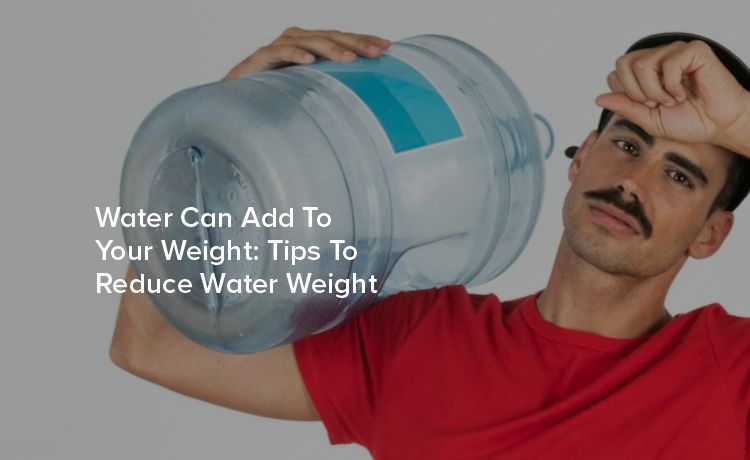
Water weight can be a frustrating and often misunderstood aspect of body weight. For many, stepping onto the scale and seeing an unexpected increase can bring about stress and confusion, especially if they've been diligently sticking to their diet and exercise regime. However, understanding water weight and how to manage it can bring some much-needed clarity and relief.
Water weight refers to the extra water that is stored in the body's tissues, joints, and cavities. Unlike fat weight, which is gained by consuming more calories than you burn, water weight is influenced by various factors, including diet, lifestyle, and certain health conditions.
Several factors can contribute to water retention, including:
Diet: High sodium intake from processed foods or added salt can lead to water retention. When your body holds on to excess sodium, it retains water to maintain the balance of electrolytes in your body.
Hormones: Hormonal fluctuations, particularly in women, can cause water retention. This is often noticed around menstruation.
Medications: Some medications, like corticosteroids, can cause your body to retain more water.
Lifestyle: Lack of physical activity and long periods of inactivity can lead to water retention, as movement helps keep fluids circulating in your body.
Health Conditions: Certain health issues, such as heart or kidney problems, can cause your body to hold on to extra water.
Water weight can manifest in different ways. Here are some signs that you may be carrying extra water weight:
Swelling: Bloating in your abdomen, legs, feet, and ankles.
Fluctuating Weight: Notable weight fluctuations within a short period.
Press Test: When you press on your skin, especially around the ankles or shins, an indentation that stays for a few seconds can indicate fluid retention.
Understanding how to manage and reduce water weight can help you feel more comfortable and confident. Here are some effective strategies:
1. Reduce Sodium Intake
One of the most effective ways to reduce water retention is to cut back on sodium. This means avoiding processed foods, such as chips, canned soups, and deli meats, and opting instead for fresh, whole foods. When cooking at home, use herbs and spices to flavor your meals instead of adding salt.
2. Stay Hydrated
It might seem counterintuitive, but drinking more water can help your body release excess water. Staying well-hydrated encourages your kidneys to flush out excess sodium and water. Aim for at least 8 glasses of water a day, and more if you're active or in a hot climate.
3. Increase Physical Activity
Regular exercise helps improve circulation and can aid in reducing water retention. Even a simple walk can help. Incorporating cardiovascular exercises and resistance training into your routine can be particularly effective.
4. Eat Potassium-Rich Foods
Potassium can help balance sodium levels in your body and reduce water retention. Foods rich in potassium include bananas, avocados, sweet potatoes, spinach, and tomatoes.
5. Get Enough Sleep
Lack of sleep can affect the balance of fluids in your body. Aim for 7-9 hours of quality sleep per night to help regulate hydration levels.
6. Manage Stress
Chronic stress can increase cortisol levels, which may lead to water retention. Practice stress-relieving activities like yoga, meditation, deep breathing exercises, or even simply spending time in nature.
7. Watch Your Carbohydrate Intake
Carbohydrates are stored in the muscles and liver as glycogen, which pulls in water. For every gram of glycogen stored, about 3-4 grams of water can be retained. Reducing your carbohydrate intake can help reduce water weight quickly, but it's important to maintain a balanced diet.
8. Try Natural Diuretics
Certain foods and herbs act as natural diuretics, helping your body expel excess water. These include:
Always consult with a healthcare provider before trying natural diuretics, especially if you have underlying health conditions or are on medication.
9. Elevate Your Feet
If you notice swelling in your lower extremities, elevating your feet can help. Prop your feet up on a pillow or footrest for a period each day to help fluids circulate more effectively.
10. Consider Compression Socks
Compression socks can help reduce swelling, particularly in the legs and feet, by promoting better circulation. These can be especially helpful if you spend long periods standing or sitting.
While water weight is usually a temporary issue, persistent water retention can be a sign of a more serious health condition. If you notice chronic swelling, rapid weight gain, or other concerning symptoms, it's important to seek medical advice.
Water weight can be an inconvenience, but it’s usually manageable with lifestyle adjustments and healthy habits. By understanding what causes water retention and implementing these practical tips, you can help your body maintain a more balanced state and feel more comfortable in your own skin. Citizens Specialty Hospital is the best hospital for the Internal Medicine treatment in Hyderabad.
Dr M. Suneetha is one of the top medical oncologists in Gurugram. He has a vast experience of more than 30 years in the field of Medical oncology. He his specialised in treating leukemia,lymphoma, hematological oncology and other complex oncology cases . He is also specialised in Bone Marrow Transplantation (BMT) treatment. He is working as a Senior Consultant, HOD, Medical Oncologist in American Oncology Institute, Gurugram.